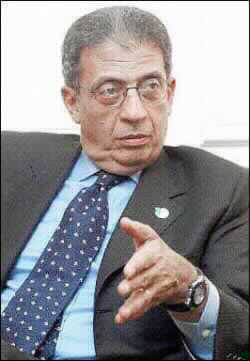The 22-member Arab League held preparatory talks ahead of a summit on the Iraq crisis, which has opened divisions within the ranks.Iraqi Foreign Minister Naji Sabri said Baghdad hoped the summit in Egypt's Red Sea resort of Sharm el-Sheikh would adopt "a firm stand" against the threatened US-led attack on his country.
"The Arab people and the Arab street are looking for their governments to adopt a firm stand against aggression because it targets not only Iraq but the whole of the Arab world," he told reporters in Cairo on Wednesday.
According to Arab League sources, Saturday's summit is expected to call for Iraq "to cooperate fully" with UN weapons inspectors so as to eliminate any pretext for military action to enforce Baghdad's disarmament.
Iraq Drops Demand Summit Be Delayed Until Mid-March
Delegates from all 22-member states held preparatory meetings in Sharm el-Sheikh on Wednesday, after Iraq dropped its demand for the summit to be postponed until mid-March.
Arab League Secretary General Amr Mussa, meanwhile, confirmed that his United Nations counterpart Kofi Annan would attend the summit opening.
Iraq's mission to the League said Baghdad's delegation would be headed by Ezzat Ibrahim, number two to President Saddam Hussein on the ruling Revolutionary Command Council.
It will also include Vice President Taha Yassin Ramadan and Sabri.
Iraq asked for the postponement to allow it to concentrate on the arms inspections and fending off a war, but changed its stand after assurances that the meeting would not be hijacked by US allies to provide cover for a strike.
Ministerial Session Convenes Early Saturday
Mussa said Arab foreign ministers would consult on Thursday and hold a formal meeting early Saturday, just ahead of the summit, which will be chaired by Bahrain.
Iraqi Crisis Splits Arab States into Two Camps
But the crisis over Iraq's disarmament has split Arab states into two camps: the "radicals" such as Syria which want the summit to condemn any strike and the "moderate" pro-US states such as Egypt and the Gulf states.
A foreign ministers' meeting in Cairo ended in acrimony on February 16 after League members hosting US forces, notably Kuwait and Qatar, came under criticism.
Egyptian Foreign Minister Ahmed Maher, whose country lobbied hard for the summit to convene early, said Tuesday the meeting "will do what it can to spare Iraq military action."
Assurances Summit Won't Endorse Military Action
Qatari Foreign Minister Sheikh Hamad bin Jassem al-Thani, whose country hosts key elements of the US buildup in the Gulf, has also provided assurances the summit would not endorse military action.
Mussa said Libyan leader Moamer Kadhafi, who originally opposed an early summit, also agreed to attend, while President Emile Lahoud was to represent Lebanon.
Lebanese Foreign Minister Mahmoud Hamoud said his country would press for Arab leaders to reject "any attack on an Arab state, notably Iraq", echoing a resolution adopted at a Beirut summit in March 2002.
Apart from Saddam, who has not attended an Arab summit abroad since 1989, Saudi King Fahd, Emirati President Sheikh Zayed bin Sultan al-Nahayan and Kuwait's emir Sheikh Jaber are also expected to stay away.
Palestinian leader Yasser Arafat, blockaded by Israeli occupation forces in his Ramallah headquarters in the West Bank, is also a certain absentee.
PHOTO CAPTION
Arab League Secretary General Amr Mussa, meanwhile, confirmed that his United Nations counterpart Kofi Annan would attend the Arab summit on Iraq opening in Sharm al-Sheikh, Egypt, Saturday, March 1,
- Author:
& News Agencies - Section:
WORLD HEADLINES


 Home
Home Discover Islam
Discover Islam Quran Recitations
Quran Recitations Lectures
Lectures
 Fatwa
Fatwa Articles
Articles Fiqh
Fiqh E-Books
E-Books Boys & Girls
Boys & Girls  Hajj Rulings
Hajj Rulings Hajj Fatwas
Hajj Fatwas














